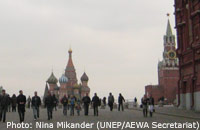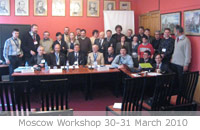Moscow workshop _ a further step towards promoting Russian accession to AEWA
 Bonn
Bonn
/ Moscow, 20 April 2010 - The UNEP/AEWA Secretariat
organized a two-day workshop together with the All-Russian
Research
Institute for Nature Conservation at the Moscow Zoo on
30-31 of March to promote the accession of the Russian
Federation to the African-Eurasian Migratory Waterbird
Agreement (AEWA).
The Russian Federation is extremely
important for migratory waterbirds – especially for
populations breeding in the Russian Palearctic. Approximately
40 % of the Russian Federation falls within the African-Eurasian
flyway and is geographically covered by the Agreement.
In addition the Russian Federation hosts approximately
50 % of the migratory waterbird populations which are listed
under AEWA and for which action is being taken under the
Agreement’s framework.
Day one focused on the concept and importance of flyway
conservation in general, on the Agreement itself, benefits
and obligations of AEWA member states, waterbird protection
in Russia including new data from international projects
and an overview of waterbird species statuses in Russia
in comparison to population statuses in the Agreement.
The second day was dedicated to the topic of hunting and
the sustainable management of waterbird populations. It
was stressed that truly sustainable management of migratory
waterbird species can only be achieved through international
cooperation. The Secretariat stressed that issues such
as spring hunting and the phasing out of lead shot in wetlands
should not be viewed as definite obstacles to joining the
Agreement. Discussions on these and other outstanding issues
still need to be conducted in detail.
 Participants included representatives from the Russian
Participants included representatives from the Russian
Ministry of Natural Resources and the Ecology, the Russian
Ministry of Foreign Affairs, representatives from regional
authorities, the Geese and Swans Study Group of Northern
Eurasia, the Russian Bird Ringing Centre, various Russian
Hunting organizations as well as NGOs. The workshop was
also attended by representatives from CIC, Wetlands International
and OMPO as well as the Dutch Ministry of Agriculture and
the Dutch embassy in Moscow.
The workshop ended with the signing of a document containing
conclusions and recommendations from the workshop participants
to the Russian Ministry of Natural Resources and the Ecology
and UNEP/AEWA Secretariat, highlighting amongst other issues
the need to continue consultations aiming at Russian accession
to the Agreement. The conclusions were signed by the workshop
chair Dr. Gerard Boere, AEWA Executive Secretary Bert Lenten
and the Director of the All-Russian Research Institute
for Nature Conservation Andrey Subbotin.
This outcome is a step in the right direction but work
still needs to be done on clarifying open questions as
well as lobbying key decision makers on the importance
of international waterbird conservation and the benefits
therein. The UNEP/AEWA Secretariat and the All-Russian
Research Institute for Nature Conservation pledged to report
back on the continued negotiations to workshop participants
by the end of 2010.
The workshop was funded by the Dutch Embassy in Moscow
and the Swiss Federal Department for Environment, Transport,
Energy and Communication.
Further information:
Last updated on 16 June 2014


